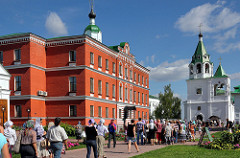Polina Barskova, Anna Glazova, and Maria Stepanova belong to the last generation of Russian poets formed by the Soviet experience. Born in the 1970s, they are old enough to have visceral memories of Soviet life but young enough to move adeptly with the new influences, new media, and new choices introduced in the post-Soviet era. Educated in Soviet, European, and U.S. universities, they share a cerebral firepower they exercise in their chosen professions—Barskova and Glazova as scholars, teachers, and translators, Stepanova as an influential online journalist. Together they represent a contemporary Russian culture that extends beyond national borders: Barskova has immigrated to the U.S., Glazova is based in Germany, and Stepanova is a lifelong Muscovite.
Their generation is also the last one raised on Russian modernism, which these poets are renovating from within. While many younger poets are writing free verse, Barskova and Stepanova exercise their mastery of verse form even as they experiment with more open texts; Glazova’s minimalist poems are influenced by late European modernism. While they possess the modernists’ erudition, they decline to worship high culture. They have no patience for modernist mythologies of the poet, which they treat with skepticism and humor. They have put behind them the modernists’ death match with totalitarianism to think critically about current politics and culture. They mistrust lyric emotion, confidently moving beyond Marina Tsvetaeva and Anna Akhmatova as poets of female desire while remaining conscious of themselves as writing women. Women are more influential in Russian poetry than ever before, as the forthcoming anthology of these poets’ work signals (Relocations, Zephyr Press, 2013).
Polina Barskova’s poem was written in Russian but has an English title, marking her relocation to the English-speaking world even as she turns to her Saint Petersburg past—hence her attention to the figure of Orpheus, named in the funhouse mirror of a title she gave her first book of poems after emigrating, Eurydeus and Orphice. With every new book, she shifts her manner and attention, giving her career an exceptionally mobile, open-ended feel. That sense of freedom is palpable in “The Act of Darkness,” whose atmosphere is bohemian, even decadent. Anna Glazova is more ascetic, more focused on existential concerns, and strongly influenced by Paul Celan, whom she studies and translates into Russian. In each small poem, she closes in on a sensory event, pushing beyond the surface of experience to discern its “laws,” warping her native language to the purpose. Maria Stepanova, an independent journalist, investigates the life of culture, namely, the physical and social body in all its symptomatic readability. (She titled one prize-winning collection Physiology and Small History.) Her poem about visiting the Moscow Zoo while pregnant with her son showcases her antic imagination and sardonic feminism. Stepanova’s poetry, like her journalism, answers the Russian situation, now more fractured and chaotic, and always commanding our attention.
Catherine Ciepiela writes about and translates modern Russian poetry. She is the author of The Same Solitude: Boris Pasternak and Marina Tsvetaeva and co-editor of The Stray Dog Cabaret: A Book of Russian Poems, by translator Paul Schmidt. She is currently translating into English Tsvetaev’s poetry collection After Russia. Ciepiela teaches at Amherst College.
[Purchase your copy of Issue 06 here]



